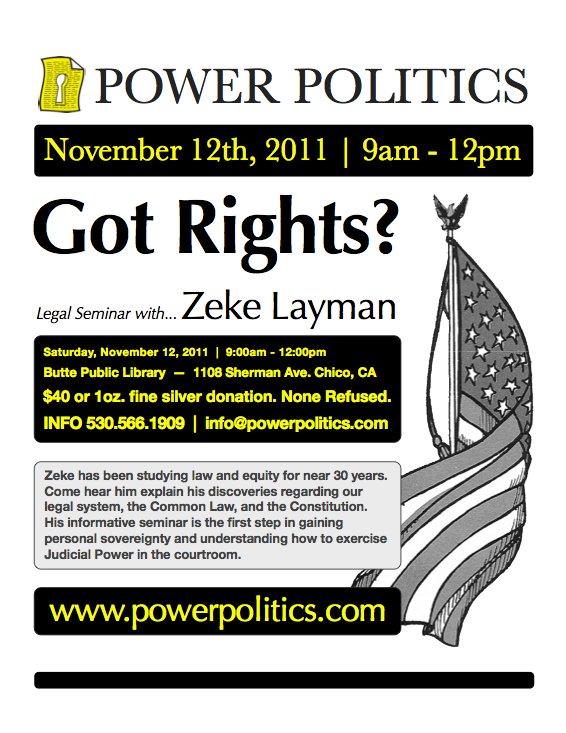I’ve compiled an excellent list of the most potent quotes from the recent case Carol Anne Bond v U.S. and the decision by the Circuit Court that was made September 17, 2009.
The Supreme Court ruled June 16, 2011. The question before the Court is, “whether a person indicted for violating a federal statute has standing to challenge its validity on grounds that, by enacting it, Congress exceeded its powers under the Constitution, thus intruding upon the sovereignty and authority of the States.”
It appears that although the answer was obvious to both the government (plaintiff) and the Circuit Court, the question had never been presented to the Supreme Court. The Court of Appeals held that because a State was not a party to the federal criminal proceeding, petitioner (Bond) had no standing to challenge the statute as an infringement upon the powers reserved to the States.
It turns out that Courts have been operating on the above presumption for more than 70 years and that the foundation for denying individuals Constitutional Article III standing was based on one line a 1939 case that conflated the “cause of action” doctrine with the “standing” doctrine. This is why, whenever I or anyone I told to challenge the jurisdiction of the court, were denied without any reason. The courts were “automatically” refusing to let any individual make a challenge before they even heard what the challenge was. In other words, we were denied the “standing’ to make a challenge because the “presidents” from this 1939 case was that individuals needed a State to be a party, also. Of course this was found to be erroneous by the court and people have been wrongfully denied their right to challenge since 1939.
As said above, the government and the Circuit Court couldn’t defend their own judgement and the case has been remanded for the lower court to hear Bond’s challenge and make a ruling on it.
Hear are a few of the beautiful quotes that I feel make this case totally remarkable:
“The Court of Appeals asked for supplemental briefs on the question whether Bond had standing to raise the Tenth Amendment as a ground for invalidating a federal statute in the absence of a State’s participation in the proceedings.”
“When Bond sought certiorari, the Government advised this Court that it had changed its position and that, in its view, Bond does have standing to challenge the constitutionality of §229 on Tenth Amendment grounds.”
“To conclude that petitioner lacks standing to challenge a federal statute on grounds that the measure interferes with the powers reserved to States, the Court of Appeals relied on a single sentence from this Court’s opinion in Tennessee Elec. Power Co. v. TVA, 306 U. S. 118 (1939).”
“One who seeks to initiate or continue proceedings in federal court must demonstrate, among other requirements, both standing to obtain the relief requested, see Lujan v. Defenders of Wildlife, 504 U. S. 555, 560–561 (1992), and, in addition, an ‘ongoing interest in the dispute’ on the part of the opposing party that is sufficient to establish “concrete adverseness.”
“Even though decisions since Tennessee Electric have been careful to use the terms “cause of action” and “standing” with more precision, the distinct concepts can be difficult to keep separate.”
“Still, the question whether a plaintiff states a claim for relief “goes to the merits” in the typical case, not the justiciability of a dispute, id., at 92, and conflation of the two concepts can cause confusion.”
“The federal system rests on what might at first seem a counterintuitive insight, that “freedom is enhanced by the creation of two governments, not one.” Alden v. Maine, 527 U. S. 706, 758 (1999). The Framers concluded that allocation of powers between the National Government and the States enhances freedom, first by protecting the integrity of the governments themselves, and second by protecting the people, from whom all governmental powers are derived.”
“The allocation of powers in our federal system preserves the integrity, dignity, and residual sovereignty of the States. The federal balance is, in part, an end in itself, to ensure that States function as political entities in their own right.
But that is not its exclusive sphere of operation. Federalism is more than an exercise in setting the boundary between different institutions of government for their own integrity. “State sovereignty is not just an end in itself: ‘Rather, federalism secures to citizens the liberties that derive from the diffusion of sovereign power.’” New York v. United States, 505 U. S. 144, 181 (1992) (quoting Coleman v. Thompson, 501 U. S. 722, 759 (1991) (Blackmun, J., dissenting)).”
“Federalism secures the freedom of the individual.”
“Federalism also protects the liberty of all persons a State by ensuring that laws enacted in excess of dele gated governmental power cannot direct or control their actions.”
“An individual has a direct interest in objecting to laws that upset the constitutional balance between the National Government and the States when the enforcement of those laws causes injury that is concrete, particular, and redressable. Fidelity to principles of federalism is not for the States alone to vindicate.”
“The structural principles secured by the separation of powers protect the individual as well.”
“Just as it is appropriate for an individual, in a proper case, to invoke separation-of-powers or checks-and balances constraints, so too may a litigant, in a proper case, challenge a law as enacted in contravention of constitutional principles of federalism.”
“In this case, however, where the litigant is a party to an otherwise justiciable case or controversy, she is not forbidden to object that her injury results from disregard of the federal structure of our Government.”
These are some of the main quotes from the Court’s Opinion written by Justice Kennedy. This case was made unopposed and agreed to by the Justices 9-0. Next newsletter, I will discuss the concurring opinion by Justice Ginsburg, with whom Justice Breyer concurred and you won’t believe the things she says after she begins her separately written, but short opinion to make “The Following Observation.”

